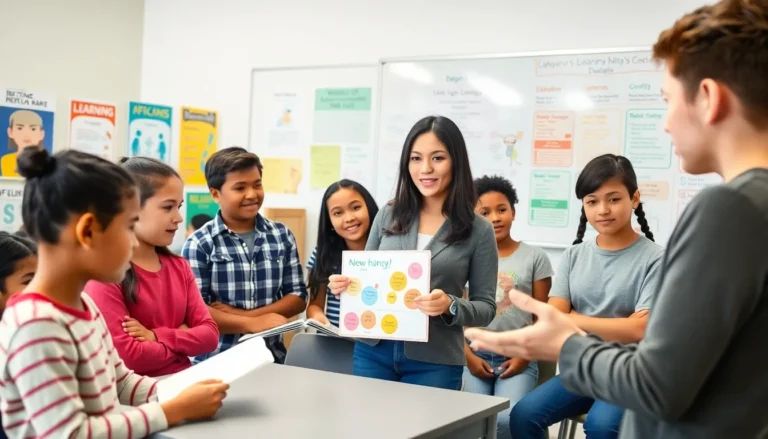Table of Contents
ToggleIn today’s interconnected world, strong language skills are more important than ever. Whether for personal growth, career advancement, or social interaction, enhancing language abilities opens doors to new opportunities. People who invest in their language skills often find themselves better equipped to navigate diverse environments and communicate effectively.
Language skills enhancement isn’t just about mastering vocabulary or grammar; it’s about building confidence and fostering connections. By exploring various methods and resources, individuals can tailor their learning experiences to fit their unique needs. From immersive practices to engaging technology, the journey to improved language proficiency can be both enjoyable and rewarding.
Understanding Language Skills Enhancement
Language skills enhancement plays a critical role in enabling effective communication and fostering personal and professional development. It encompasses improving various linguistic aspects, tailored to individual needs.
Importance of Language Skills
Language skills form the foundation of interpersonal connections and professional success. Effective communicators can express thoughts clearly, leading to improved relationships and collaboration. Strong language capabilities also enhance critical thinking and problem-solving. Individuals adept in language can engage more effectively in diverse environments, navigating cultural differences with ease. Additionally, organizations increasingly prioritize employees with excellent language skills, as they contribute to better teamwork and customer relations.
Key Areas of Improvement
Focusing on key areas can significantly optimize language skills.
- Vocabulary: Expanding vocabulary enhances expression. Diverse word choices enable nuanced communication.
- Grammar: Mastery of grammar rules improves clarity. Correct sentence structures elevate the quality of written and spoken language.
- Pronunciation: Clear pronunciation fosters understanding. Proper articulation minimizes miscommunication.
- Listening Comprehension: Active listening skills lead to better interaction. Understanding spoken language enhances engagement and response accuracy.
- Reading Comprehension: Strong reading skills facilitate information processing. Comprehending various texts improves overall language proficiency.
Enhancing language skills in these areas enables individuals to communicate effectively and confidently, paving the way for personal growth and professional opportunities.
Techniques for Language Skills Enhancement

Enhancing language skills involves targeted strategies that promote growth in reading, writing, and comprehension. Implementing effective techniques facilitates improvements in communication abilities, fostering personal and professional development.
Reading and Comprehension Strategies
- Active Reading: Engage with texts by highlighting key concepts, taking notes, and summarizing paragraphs to enhance understanding.
- Diverse Materials: Read various genres, including fiction, non-fiction, newspapers, and academic journals, to expose oneself to different writing styles and vocabularies.
- Discussion Groups: Join reading clubs or discussion groups to cultivate deeper insights and perspectives through conversation about the material.
- Questioning Techniques: Ask questions before, during, and after reading to stimulate critical thinking and foster a better grasp of the content.
- Vocabulary Tracking: Keep a vocabulary journal to log new words and phrases, ensuring regular review and application in context.
Writing Improvement Techniques
- Daily Writing Practice: Set aside time each day for writing, whether through journaling, blogging, or creative writing, to build fluency and confidence.
- Structured Outlining: Utilize outlines to organize thoughts and structure arguments effectively before drafting written work.
- Peer Review Sessions: Engage peers for feedback on writing, allowing for constructive criticism and identification of areas for improvement.
- Study of Writing Styles: Analyze the writing styles of various authors to recognize techniques and adapt them to one’s own writing.
- Editing and Revision: Regularly revise written work to enhance clarity and coherence while focusing on grammar, punctuation, and style.
Role of Technology in Language Skills Enhancement
Technology plays a crucial role in enhancing language skills by providing innovative tools and resources that cater to various learning preferences. These advancements enable learners to access diverse materials, communicate effectively, and practice language skills conveniently.
Language Learning Apps
Language learning apps significantly aid in skill development by offering interactive features. These applications, like Duolingo or Babbel, utilize gamification to make learning engaging. Users can practice vocabulary, grammar, and pronunciation through concise lessons, quizzes, and real-time feedback. Many apps incorporate speech recognition to evaluate pronunciation accuracy, allowing learners to refine their speaking skills. Apps also facilitate personalized learning paths, enabling users to focus on their specific needs and progress at their own pace.
Online Courses and Resources
Online courses and resources offer structured programs for those seeking comprehensive language education. Platforms like Coursera and edX partner with top universities to provide professional-led courses covering grammar, conversation skills, and cultural context. These courses often feature multimedia content, interactive assignments, and discussion forums that encourage collaboration among learners. Additionally, websites like TED-Ed and YouTube facilitate exposure to native speakers, enhancing listening skills and cultural understanding. This vast array of tools empowers individuals to pursue their language learning goals with flexibility and efficiency.
Benefits of Language Skills Enhancement
Enhancing language skills offers numerous advantages that positively impact various aspects of life, including personal growth and professional success.
Personal Development
Personal development benefits significantly from enhanced language skills. Enhanced language abilities foster self-confidence, allowing individuals to express themselves clearly and effectively. Improved communication promotes deeper relationships, as individuals can articulate thoughts and emotions with greater precision. Exposure to new languages broadens cultural awareness and sensitivity, enriching personal interactions and providing a global perspective. Additionally, enhanced language skills contribute to cognitive development by encouraging critical thinking, problem-solving, and improved memory retention.
Career Advancement
Language skills enhancement actively influences career growth. Employers seek candidates with strong communication abilities, as these individuals effectively collaborate within teams and engage with clients. Proficient language skills open doors to leadership roles, as clear expression of ideas enhances team dynamics and project success. Furthermore, languages can create opportunities in global markets, allowing professionals to connect with diverse clients and colleagues. Continuous improvement in language skills promotes adaptability and competitiveness in an ever-evolving job landscape.
Enhancing language skills is a vital investment in personal and professional growth. It opens doors to new opportunities and fosters deeper connections with others. By focusing on targeted techniques and leveraging technology, individuals can make significant strides in their language proficiency.
The journey to improved communication is both rewarding and essential in today’s global landscape. With dedication and the right resources, anyone can elevate their language abilities, leading to greater confidence and success. Embracing this journey not only enriches one’s life but also enhances interactions across diverse environments.







